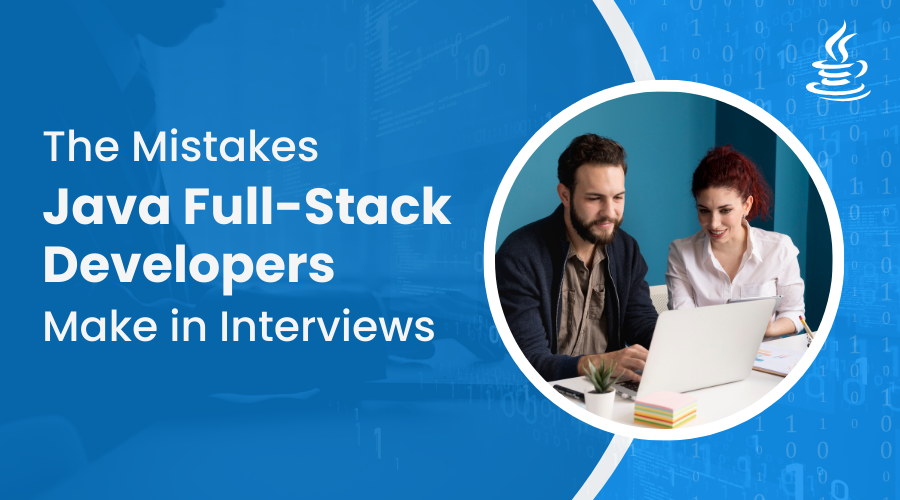Introduction:
The journey to becoming a Java full-stack developer is indeed thrilling, teeming with opportunities to craft innovative solutions and significantly impact the digital world. Yet, as you embark on this path, it’s crucial to navigate the interview process with care. This phase is peppered with potential mistakes that can easily trip up students and those new to the field. From technical oversights to not fully showcasing your problem-solving prowess, there are several common errors that can dampen your chances of snagging that dream job.
Fear not, though, as we’re here to illuminate these pitfalls, ensuring you stride into your interviews armed with confidence, clarity, and a robust strategy to dazzle your future employers. And what’s at the end of this challenging journey? A rewarding career with enticing java developer salaries prospects, among other perks. Let’s look deeper into how avoiding these common mistakes not only enhances your chances of success but also positions you to command a competitive salary as a Java full-stack developer.
Not Brushing Up on Java Fundamentals
Java fundamentals are the bedrock of full-stack development. Overlooking the basics like syntax, core libraries, and JVM intricacies is like building a house without a foundation. Review core concepts, practice coding without relying heavily on IDEs, and ensure you understand the why behind the how.
Ignoring Front-End Technologies
Java full-stack developers are not just about the back-end; a solid grasp of front-end technologies is crucial. HTML, CSS, and JavaScript are your bread and butter, along with frameworks like React or Angular. Showcasing a project that integrates front-end and back-end seamlessly can significantly up your game.
Overlooking Soft Skills
Technical prowess alone won’t cut it. Communication, teamwork, and problem-solving are key to thriving in developer roles. Prepare examples of past projects where you solved complex problems or improved team dynamics. Remember, how you articulate your thought process can be as important as the solution itself.
Failing to Understand the Full Stack
It’s not enough to have a passing knowledge of each layer in the stack; understanding how they interact is vital. Be prepared to discuss how your Java back-end services communicate with the front-end, how you manage database interactions, and your approach to API development.
Neglecting Design Patterns and Best Practices
Design patterns are solutions to common problems. Not being familiar with these or coding best practices can raise red flags. Dive into MVC, Singleton, Factory, and Observer patterns. Understand when and why to use them, and how they can make your code more efficient and maintainable.
Underestimating the Importance of Version Control
Version control is non-negotiable in today’s development environment. Git is your friend, and understanding its workings is essential. Be ready to discuss branching strategies you’ve used, your experience with pull requests, and how you handle merge conflicts.
Poor Error Handling
Error handling is an art. It’s not just about try-catch blocks; it’s about creating a robust system that can withstand and recover from unexpected states. Discuss how you implement error handling, and maybe share a scenario where thoughtful error handling saved the day.
Forgetting about Security
Security should never be an afterthought. Understanding common security threats (like SQL injection, XSS, CSRF) and how to mitigate them is crucial. Be prepared to talk about how you secure applications and the practices you follow to keep data safe.
Skipping Testing
Testing is an integral part of development, not a final step. Familiarize yourself with unit testing, integration testing, and TDD approaches. Discuss how testing fits into your development workflow and how it improves the quality and reliability of your code.
Not Asking Questions
The interview is a two-way street. Not asking questions can come off as disinterest or overconfidence. Prepare thoughtful questions about the company’s tech stack, project methodologies, or team structure. It shows you’re engaged and serious about the role.
Ignoring Cultural Fit
Ignoring the cultural fit can seriously hinder your chances during the interview process. Every company boasts a distinctive culture, characterized by specific values, missions, and operational styles. Achieving harmony with this culture is not only essential for job satisfaction but also plays a pivotal role in your long-term success within the organization. It’s imperative to thoroughly research and understand these aspects beforehand.
Reflect deeply on how your personal values, ethics, and working style align with the potential employer’s culture. Demonstrating this alignment in your interview can significantly elevate your standing as a candidate, showing you’re not only technically adept but also a seamless fit for their team dynamics. This approach underscores the importance of cultural integration alongside technical competence, setting the stage for a fruitful and fulfilling career journey.
Conclusion
Walking into a Java full-stack developer interview unprepared is akin to navigating a storm sans umbrella—a situation you’d want to avoid at all costs. Arming yourself with a robust understanding of Java fundamentals, a comprehensive grasp of the full stack, and a suite of soft skills is non-negotiable. It’s not merely about sidestepping errors; it’s about showcasing your passion, expertise, and alignment with the role. Embarking on a Java training in Chennai or similar can refine your skills, turning potential pitfalls into stepping stones for your career. With the right prep, demonstrate your prowess and readiness to claim that dream job. Dive deep, and let your preparations reveal your true potential!

